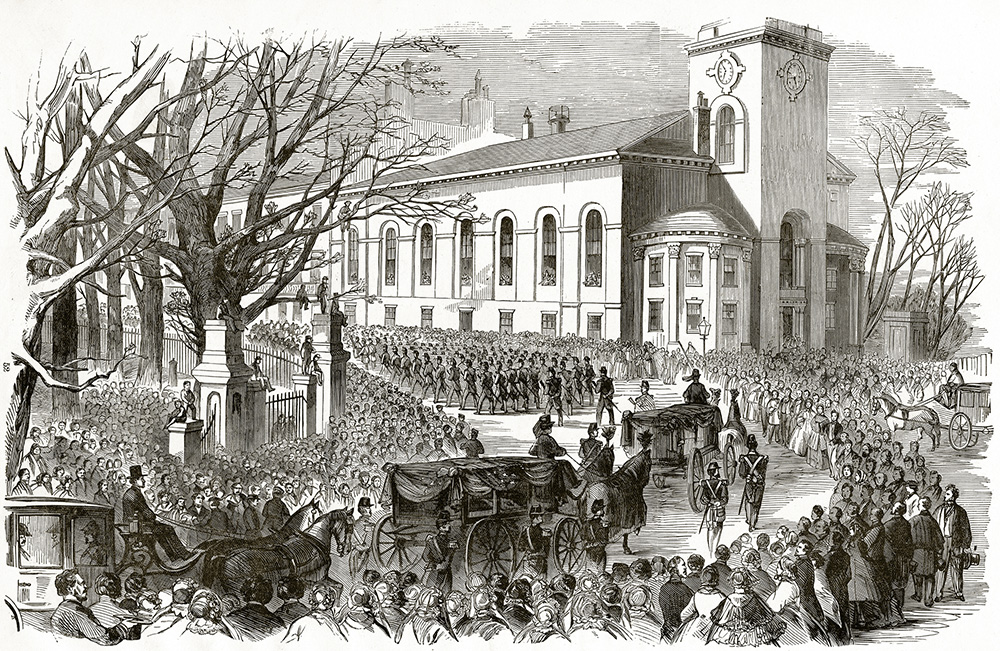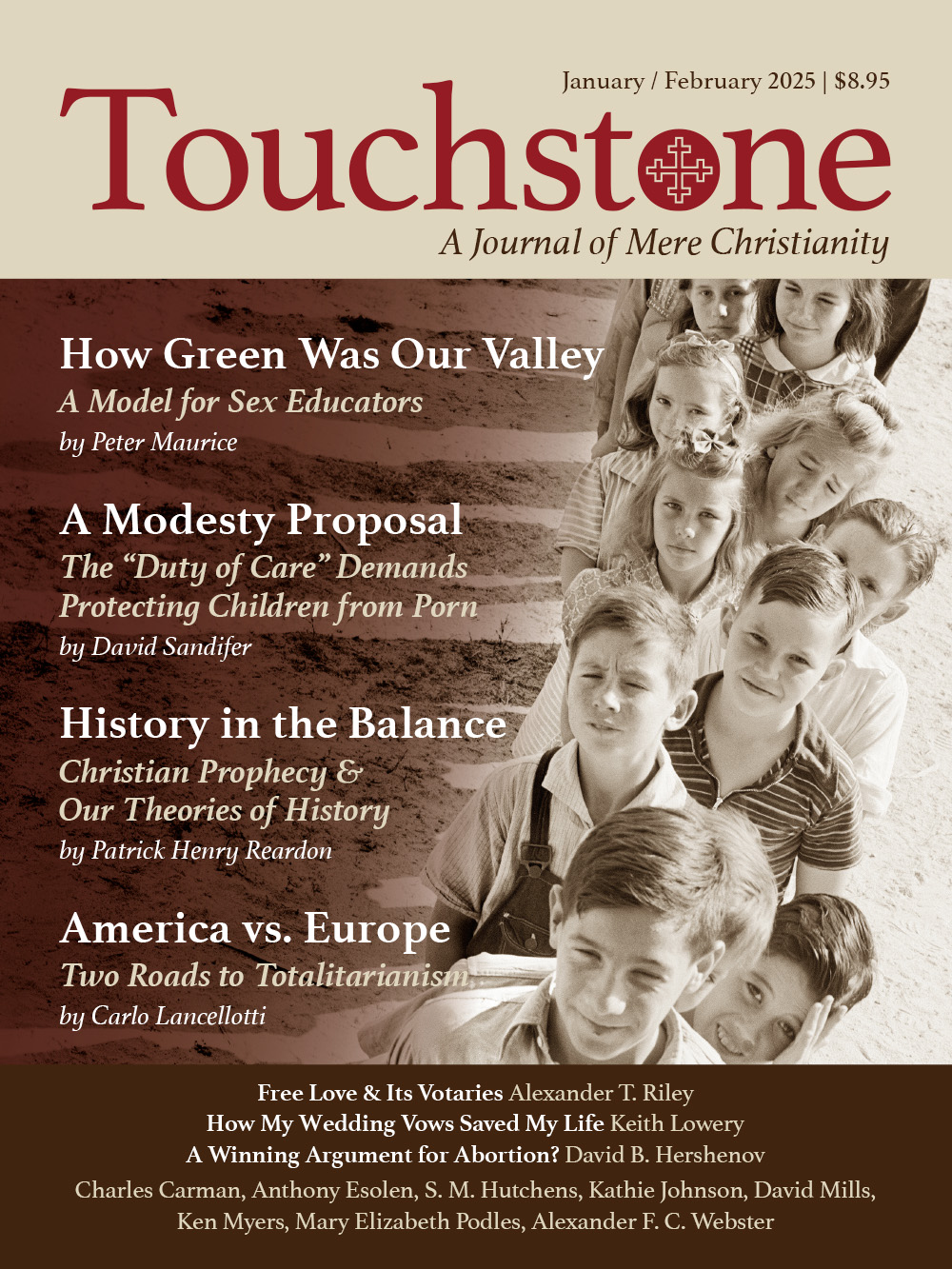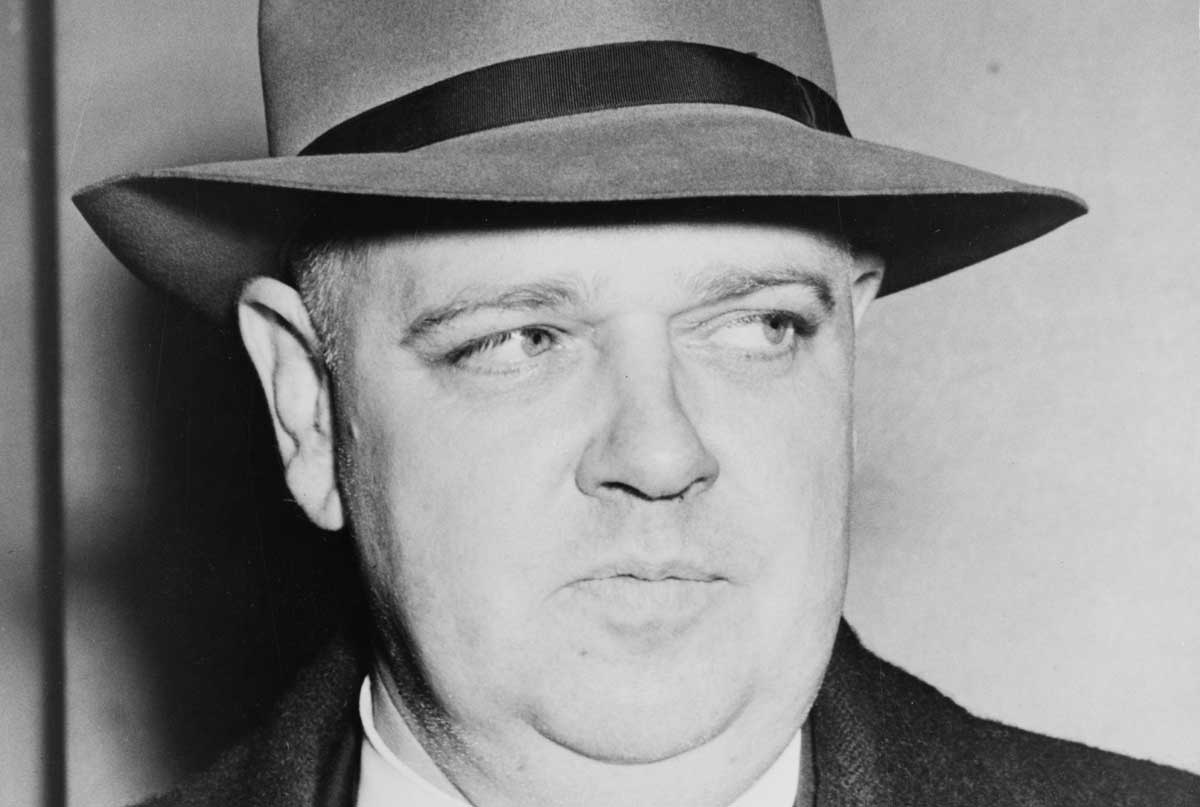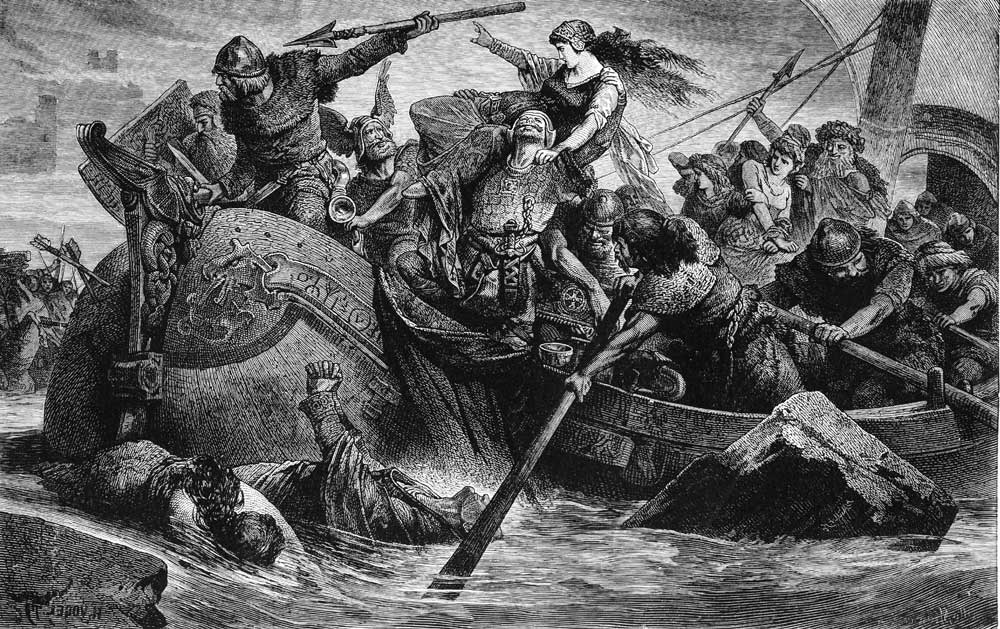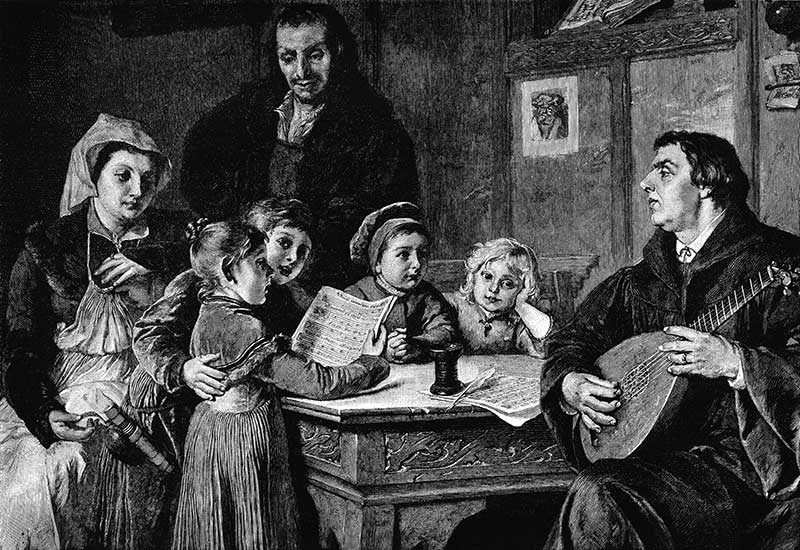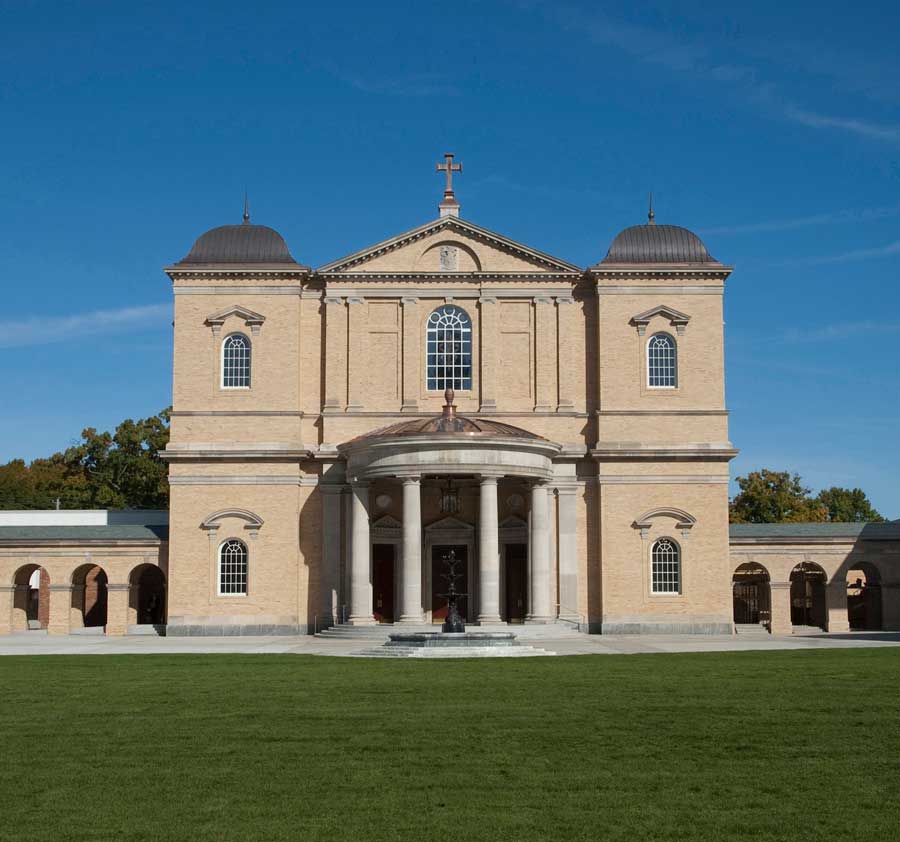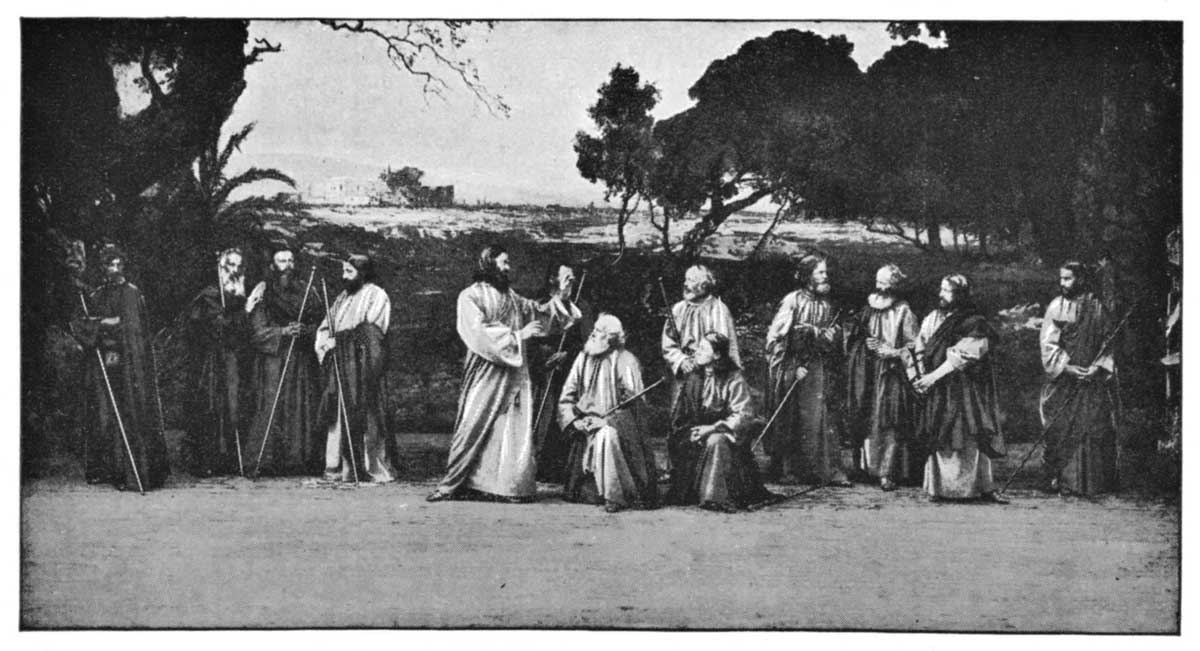History in the Balance
Christian Prophecy & Our Theories of History
In a little place called Nain, a traffic jam took shape one day, at the narrow city gate. St. Luke recorded the scene; Jesus, he tells us,
went into a city called Nain; and many of his disciples went with him, and a large crowd. And as he approached the gate of the city, behold, a dead man was being carried out, the only son of his mother; and she was a widow. And a large crowd from the city accompanied her. (7:11–12)
Although it was customary for funeral processions to claim the right of way, an exception was made in this case when Jesus “came and touched the open coffin, and the pallbearers stood still.” One presumes that Touchstone readers are familiar with the rest of the story.
Among the details worthy of further comment, however, is the response of the crowd of people who witnessed that exceptional event. When they saw the dead man suddenly sit up in his open coffin and begin to speak, “fear came upon all,” says Luke, “and they glorified God, saying, ‘A great prophet has arisen among us’ and ‘God has visited his people.’”
Prophet? How is it that Jesus is called a prophet when he raises this man to life? Why this term, specifically, in this context?
A Prophet’s Authority
I suggest there are three considerations required by this question. First, in the Hebrew Scriptures we observe that only the prophets raised anyone from the dead. We all recall the stories. There was Elijah, we remember, who raised the dead son of the widow of Zarephath. We also call to mind the prophet Elisha, who restored to life the son of the Shunammite woman.
These two instances were well known to the citizens of the village of Nain. Although they had never seen the like of what Jesus did that day, they did remember the stories of the biblical prophets who raised the dead, and they knew that the same thing was happening in their midst and before their very eyes. A son was being carried off to his grave, but suddenly Jesus “came and touched the open coffin.” When the pallbearers stopped, Jesus spoke with authority to the man that lay upon the bier, “Young man, I say to you, arise!”
That command, the crowd knew, was given with the voice of utter authority. Death itself could not withstand the force of that authority. It was the voice of a prophet, a man divinely appointed to interpret the events of history for his contemporaries. These onlookers remembered the stories of Elijah and Elisha; they knew that a great prophet had once again arisen among them.
A Prophet’s Intervention
Second, what is the connection between prophecy and the raising of the dead? That there is such a connection is obvious in the stories themselves, but just what is the nature of that connection? We best address this question, I believe, if we reflect that prophecy is the insertion of God’s Word into human existence, turning that existence into salvation history. Indeed, without the structure given to it by God’s Word, what does human history amount to?
Various theorists have pondered this question over the years. Arnold J. Toynbee, for instance, viewed history in terms of universal rhythms of rise, flowering, and decline. According to Toynbee, history is the account of civilizations that arise to meet the challenge of difficult circumstances. It is their response to these challenges that creates the dynamics of history.
Then there was Oswald Spengler, who believed that this process of flowering and decline is cyclical and determinist. Karl Marx did not believe in cycles of history. For him, history proceeds on a dialectical path, with steps forward and steps backward, the whole process moving inevitably toward a goal. There is apparently some controversy about who first said, “History is just one damned thing after another.”
This scene in Luke, however, provides the Bible’s view of the matter—namely, history without the intervention of the prophet is a pretty steady funeral march. It is the vocation of the prophet to stop this otherwise inevitable movement toward death.
And this was, in fact, what the prophets did. Whether Amos, Hosea, and Micah in the eighth century, or Habakkuk, Nahum, and Zephaniah in the seventh, the prophet in each case spoke to human events with a view to challenging a funeral procession. Confronting Assyria’s culture of death, Isaiah proclaimed the good news of God’s reign. When the forces of Babylon encamped about Jerusalem in siege, and just before the city fell to their destruction and fire, Jeremiah purchased a piece of real estate in testimony that life would overcome death. Some decades later, Ezekiel spoke to the Israelites in captivity, describing the temple that was soon to be constructed. It is the function of prophecy to confront and challenge despair.
And this is what the Jews at Nain beheld that day, when Jesus stepped in front of a funeral procession and caused it abruptly to stop. Prophecy is the insertion of the divine message into the decline and chaos of history, giving direction and purpose to the lives of men. History’s most singular act of prophecy occurred on that day when Christ rose from the dead, trampling down death by death, and giving life to those in the tombs.
A Prophet’s Death-Defying Voice
Third, the proclamation of the Gospel to the world is the Church’s prophetic mission. This proclamation, this evangelion, does not simply convey information. It is the Word of God proclaimed in power. God’s Word will not return to him empty; it will accomplish all that he sends it to do.
It seems more important than ever, right now—in today’s extensive culture of death—to insist on this point. The ancient funeral processions called Assyria, Babylon, Persia, Greece, and Rome were playground activities beside the violent and destructive society in which the Gospel must be proclaimed today. The narrative of the widow of Nain is very sobering in its application to the times in which we live, times of ideologically driven terrorism, the vast international slave trade of women and children, the daily reports of kidnapping and other violent crimes against the innocent and unoffending, an all-pervasive political cynicism, and the officially sanctioned slaughter of millions of unborn babies.
These are but the more notable evidence of the lengthy funeral procession of contemporary history. It is a fact that more human beings died of violence during the twentieth century than in all of previous human history, and there is good reason to fear that the twenty-first century may surpass it.
It is the Christian’s vocation to meet this funeral procession with the force of the prophetic Word of the Gospel. Those pallbearers described by Luke had the good sense to stop. It is not so clear that they would stop today, and Christians who would resist the culture of death had best be prepared to be run down by a hearse. This Gospel story, however, tells what happens when a death-defying voice makes itself heard, and God once again visits his people.
Patrick Henry Reardon is pastor emeritus of All Saints Antiochian Orthodox Church in Chicago, Illinois, and the author of numerous books, including, most recently, Out of Step with God: Orthodox Christian Reflections on the Book of Numbers (Ancient Faith Publishing, 2019).
subscription options
Order
Print/Online Subscription

Get six issues (one year) of Touchstone PLUS full online access including pdf downloads for only $39.95. That's only $3.34 per month!
Order
Online Only
Subscription

Get a one-year full-access subscription to the Touchstone online archives for only $19.95. That's only $1.66 per month!
bulk subscriptions
Order Touchstone subscriptions in bulk and save $10 per sub! Each subscription includes 6 issues of Touchstone plus full online access to touchstonemag.com—including archives, videos, and pdf downloads of recent issues for only $29.95 each! Great for churches or study groups.
Transactions will be processed on a secure server.
more on History from the online archives

15.6—July/August 2002
Things Hidden Since the Beginning of the World
The Shape of Divine Providence & Human History by James Hitchcock
more from the online archives
calling all readers
Please Donate
"There are magazines worth reading but few worth saving . . . Touchstone is just such a magazine."
—Alice von Hildebrand
"Here we do not concede one square millimeter of territory to falsehood, folly, contemporary sentimentality, or fashion. We speak the truth, and let God be our judge. . . . Touchstone is the one committedly Christian conservative journal."
—Anthony Esolen, Touchstone senior editor





